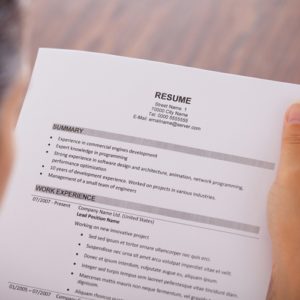Once you finish taking cooking classes in Boulder, Colorado, you might begin looking for a position in a kitchen. To land a job, you need a resume that’s going to make an impression on hiring managers and convince them that they need to bring you in for an interview. Here are some tips for writing a resume that will stand out in all the right ways:
Resumes 101
At the end of the day, a resume needs to do two things: It needs to tell potential employers why you’re a good fit for the job, and it needs to let them know how to reach you. This means your resume has to include your name and contact information, and sections that sell you as an employee. These sections are usually “Education,” “Experience” and “Skills,” but they can be tweaked based on what experience you currently have. If you’re just getting started, your “Experience” section is going to be bare – and that’s OK. Everyone starts somewhere, so use other parts of the resume to show your stuff.
Achievements, not tasks
The easiest way to take your resume from average to interesting is to list achievements rather than tasks. Tasks only show that you did the work that was assigned to you: They don’t convey whether or not you did them well. Instead of saying, “Made salads” say, “Gained a reputation for efficient and skilled salad preparation.” The second example still tells your potential employer what kind of work you have experience in, but it also tells him or her that you succeeded at the task.
Get specific
The last thing you want your resume to be is vague. Make sure when you’re listing skills and achievements you are as specific as you can be while still being succinct. It’s also important to tailor your resume for the company and position you’re applying for. Sending the same resume for every job only works if all of the openings are similar: Highlight the strengths the role needs.
Quick notes:
- Stick to basic fonts. When it comes to resumes, fonts can only stand out in a bad way.
- Don’t lie, not even little lies. Assume you will be tested on anything your resume says you can do, because you easily could be.
- Don’t use any graphics or pictures.
- Make sure your email address is professional. An easy guide for email addresses is [email protected]. A little variation is okay, but [email protected] is not.
- Use bullet points, and keep each point short and simple.
- Include any industry-related certifications or memberships you have.
- Don’t include information about personal matters like religion or family. Not only do these have nothing to do with your ability to do the job, they’re actually things that the company isn’t allowed to ask about to avoid discrimination. The best-case scenario when including this type of information is that it puts the hiring manager in an awkward position: The worst-case scenario is that they may actually do discriminate against you based on it.
- Keep your resume as short as possible. If you’re just starting off, there’s no reason for your resume to be more than a page long.
- Have someone else look over your resume to check for typos or unclear phrases.


